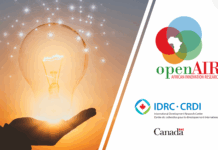By Uchenna Ugwu
How can “user rights” and exceptions to copyright be used most effectively to ensure access to knowledge for all? This question is a very important one because access to knowledge is so integral to innovation.
In May 2017, the Faculty of Law at the University of Windsor convened the Copyright User Rights and Access to Justice Symposium. The symposium was attended by distinguished legal scholars from all over the world, including such scholars as Ruth Okediji and David Vaver. It was convened to be an in-depth analysis of this question and issues examined included such things as the nature and relevance of user rights; how legal responses to technological change affect the relationship between copyright holders, users, and the public; the effectiveness of current legal options to ensure user rights; and what could be future frameworks for advancing user rights.
@LTECLabWindsor‘s Copyright User Rights & Access to Justice Symposium kicks off this morning @UWindsor! #A2J #copyright pic.twitter.com/Q35IGRwTew
— Windsor Law (@WindsorLaw) May 18, 2017
Open AIR Paper Presented at the Symposium
In addressing these issues at the Symposium, I was honored to be selected to present my paper entitled “Reconciling the Right to Learn with Copyright Protection in the Digital Age: Limitations of Contemporary Copyright Treaties”. This article examines the question of how to balance copyright, technology protection measures (TPMs), digital rights management (DRM), and anti-circumvention rules (as well as other legal measures relevant to digital technology) with the human right to learn. Article 26.1 of the United Nations Declaration on Human Rights gives the right to education and places upon governments an obligation to provide an environment suitable for learning to take place. Ensuring access to knowledge and learning material plays an important role in attaining this human right.
My research over the past year has been examining contemporary international IP treaties (the Berne Convention, TRIPS Agreement, WIPO Copyright Treaty, and WIPO Performances and Phonograms Treaty), non-IP agreements, and relevant jurisprudence. From this research, I have been finding that current frameworks for copyright protection do not adequately protect the right to learn. To help resolve this, in my presentation I made suggestions as to how countries can advance the right to learn in the digital age. These include such things as: allowing for circumvention of TPMs and DRM, making exceptions to copyright for learning mandatory, making the right to learn enforceable through national laws and policies, and improving legal access to data sharing technologies.
Important Issues Underscored at the Conference
There were a number of important issues that came up in discussions and presentations at the conference.
The first was that the current exceptions and limitations to copyright do not represent the interests of developing countries. Several speakers, including myself, showed a myriad of ways in which current copyright treaties do not enhance development, access to knowledge, and learning among the most needy. This is because the current exceptions and limitations were designed with the interests of the copyright holder (i.e. the writer or the owner) at the center. The interests protected by copyright owners, which are often multinational companies, differ from the interests that need to be protected to ensure access to the knowledge necessary for learning, especially in developing countries.
For example, even the legal term “user rights”, may not represent the interests of those in developing countries and marginalized persons. Where those who qualify as legitimate users may be limited to those with the economic capacity to license certain software, a more inclusive policy is required for poorer users. Researchers, policy makers, and society at large must ask which users the rights protect and the socio-economic impact of copyright policies.
One of the points emphasized by many, was the need to give more rights to institutions that have learning and the public interest as their focus. These would include libraries, research institutes, and universities.
In addition, many presentations and discussions showed that copyright, TPMs, and DRM regulations should be contextualized to better reflect the public interest. Effective laws grow from the customs, traditions, and interests of the people involved. Copyright regulations must equally reflect the traditional culture, values, concepts, and interests of the people and places where they are applied. The interests of the public in developing countries must be given adequate legal protection in a manner that is inclusive of their unique circumstances. Afterall, intellectual property treaties – which cover not only copyright but also patents, trademarks, and geographical indications – do not work in isolation, but are part of a web of treaties that also demand consideration of human rights, traditional knowledge, and other laws to be respected. For this reason, attendees felt that countries should be given the discretion to decide for themselves how to define user’s rights and access to knowledge based on their specific contexts.
Impact of Open AIR’s Research Recognized
I was thrilled to hear participants, such as Prof. Severine Dusollier and Prof. David Vaver, acknowledge previous Open AIR research and publications as having played a ground-breaking role in providing insight on how adopting a more inclusive concept of innovation can advance grassroots creativity in Africa. This conference also provided me with valuable insights as to the direction of my continuing research into copyright and the right to learn; provided me with others’ viewpoints and arguments that often differed from my own. In addition, it confirmed to me the importance of my research and the impact that Open AIR has been having on the concepts and norms relating to intellectual property rights and innovation. I was honored to be a presenter at the conference and wish to thank Open AIR and the University of Ottawa for their funding of my attendance. I would also like to thank the Centre for International Governance Innovation, Open AIR, and the Social Sciences and Humanities Council for their funding of my ongoing research.










